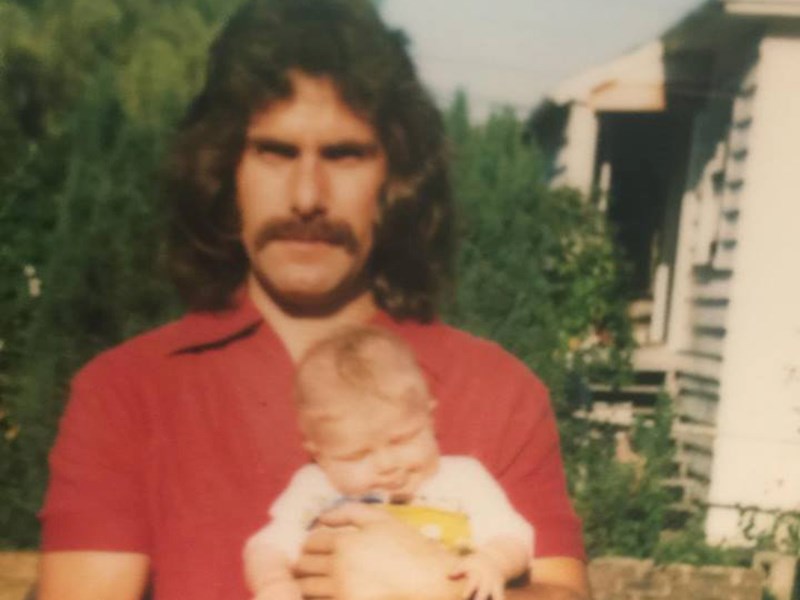Previous chapter [“The striker,” December 14]: Bernard Krieger graduated from high school right into the swingin’ 60s. He travelled from his adopted hometown of Edmonton to the exploding counterculture scene in Vancouver, then southbound to the epicentre in San Francisco, where Bernard the German and his hippie friends didn’t hold back from sampling the drugs that were available, which was a lot. Bernard would pay a stiff price for his wild ways.
In the early 1970s, Bernard the German returned to Edmonton to open up an artisan leather shop called the Settlement with one of his hippie pals. Both of them had big black matching moustaches and long hair.
They created handmade purses and belts and the shop became a very popular stop for the hippie ladies of the Alberta capital. That’s where Bernard met his first wife. They were married and soon had Misty, their first daughter.
But Alberta’s cowboy culture still didn’t jive with Bernard’s hippie look and lifestyle. Unfortunately for Bernard the German, it just so happened that Hogan’s Heroes, the television sitcom about an allied POW camp in World War II, was very popular in Edmonton. And since he was an extremely large man with a heavy German accent and a thick black moustache, Bernard was constantly compared to the bumbling Sergeant Schultz, hearing his catchphrase “I see nothing, I know nothing” far too many times to count.
Bernard the German couldn’t wait to shake the Alberta dust for a final time and get back to the welcoming West Coast. He closed the leather shop and permanently moved his family to BC when he landed a union job down at the North Vancouver docks, working for the Wheat Pool. Soon, Sarah, a second daughter was born, and Bernard settled into what turned out to be a 30-year career on the docks.
In the late 1980s, life took a sour turn: Bernard Krieger and his wife were divorced. Tragedy followed shortly after when Bernard’s ex-wife passed away.
Bernard was left as the primary caregiver for his two teenage daughters. One night at a downtown Vancouver blues bar called the Yale, Bernard met the woman who would become his second wife.
When in courtship, Bernard told her he had two dreams for the rest of his life, and one of them was to build his own cabin on the ocean in the wilderness. Soon after, Bernard spotted a one-line ad in the Vancouver Sun: Two acre lot, coastal wilderness, boat access only strata, Desolation Sound Marine Park.
To Bernard it sounded much more than a place; it sounded like an experience, exactly like the one he had been dreaming of. That property just so happened to be part of a microcolony of spread out, makeshift, and often ramshackle vacation cabins, a Desolation Sound development my dad started back in the mid-1970s.
Bernard made the trek up BC’s Sunshine Coast to check it out. First, he looked around at various properties in Powell River, but nothing suited his want for raw, oceanic wilderness.
Then he sank his toes into the white sand beaches of nearby Savary Island, but Bernard felt outclassed amongst the island’s elite, old-money residents. And when the Savary Island cabin he rented sprung a propane leak in the middle of the night, Bernard almost suffocated to death. Bernard suggested later, only half jokingly, that maybe it was the Savary people trying to send him a message.
But when Bernard the German entered the calm, warm, protected, green ocean inlets of Desolation Sound, surrounded by towering mountains dropping straight into the sea, he felt a distinct tingle up his spine. He was in awe; he had never seen anything so beautiful in his life.
Bernard the German had arrived. He had found his lost horizon, or so he thought. In 1991, he purchased a bare-rock waterfront lot on the Gifford Peninsula for $26,000, and in turn, Bernard the German became our family’s next-door neighbour.
Bernard didn’t have a lick of experience building anything except a hangover, but he and his wife set to work to construct their dream cabin on the rocks in Desolation Sound by hand: every board, window, nail and shingle. Everything had to be hauled across Okeover Inlet in their tiny boat, and dragged up the seaweed and barnacle covered rocks.
But they did it. Within a few years that included lots of trips to the “how to” section of Powell River Public Library and advice and assistance from the neighbours, they had built a beautiful eagle’s nest of a cabin, where you could look straight down from the deck into the clear ocean water to spy sharks, seals and salmon swimming through the kelp vines.
Everything Bernard and his wife did together in Desolation Sound felt like a grand adventure. When they eventually figured out how to get running water from the well in the woods into their faucets in the cabin, they jumped for joy like children.
In the dense forest of Desolation Sound Marine Park behind Bernard the German’s cabin there were plenty of predators: bears, wolves and cougars. And while his wife took the proper precautions when hiking through the woods, Bernard the German did not. He would often go traipsing off in nothing but shorts and a pair flip flops, crashing through the underbrush like a bull, until one day, deep in the forest, he was attacked.
You’ll read that story in the next chapter of Bernard the German: The tragic tale of the giant of Desolation Sound.
Grant Lawrence is an award-winning author and a CBC personality who considers Powell River and Desolation Sound his second home. "Bernard The German" is currently also airing as a weekly radio serial on North by Northwest, CBC Radio One in BC. Anyone with stories or photos they would like to share of Bernard "The German" Krieger, can send an email to grantlawrence12@gmail.com.



